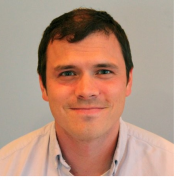
Assistant Professor
Laboratory Medicine
Brian Shy, MD, PhD directs GMP manufacturing efforts for cell and gene therapies at UCSF. His lab employs genome and epigenome engineering tools to enhance the safety and potency of cellular therapies, improve manufacturing methods, and develop new treatments for cancer, inherited immune disorders, and infectious disease.
Publications
Structure-guided engineering of CCL27 enhances natural ligand CAR T-cells against CCR10 for multiple myeloma.
bioRxiv : the preprint server for biology
SEED-Selection enables high-efficiency enrichment of primary T cells edited at multiple loci.
Nature biotechnology
Antigen-Specific T Cell Receptor Discovery for Treating Progressive Multifocal Leukoencephalopathy.
bioRxiv : the preprint server for biology
Bidirectional epigenetic editing reveals hierarchies in gene regulation.
Nature biotechnology
Engineering an Escherichia coli strain for production of long single-stranded DNA.
Nucleic acids research
Engineering an Escherichia coli strain for production of long single-stranded DNA.
bioRxiv : the preprint server for biology
Ultra-high efficiency T cell reprogramming at multiple loci with SEED-Selection.
bioRxiv : the preprint server for biology
Peptide-mediated delivery of CRISPR enzymes for the efficient editing of primary human lymphocytes.
Nature biomedical engineering
Dynamic phosphatase-recruitment controls B-cell selection and oncogenic signaling.
bioRxiv : the preprint server for biology
Pooled screening of CAR T cells identifies diverse immune signaling domains for next-generation immunotherapies.
Science translational medicine
High-yield genome engineering in primary cells using a hybrid ssDNA repair template and small-molecule cocktails.
Nature biotechnology
Proceedings from the Blood and Marrow Transplant Clinical Trials Network Myeloma Intergroup Workshop on Immune and Cellular Therapy in Multiple Myeloma.
Transplantation and cellular therapy
CRISPR-Cas9-mediated nuclear transport and genomic integration of nanostructured genes in human primary cells.
Nucleic acids research
Polyclonal Regulatory T Cell Manufacturing Under cGMP: A Decade of Experience.
Frontiers in immunology
Targeted delivery of CRISPR-Cas9 and transgenes enables complex immune cell engineering.
Cell reports
Hospital-Based Donor Recruitment and Predonation Serologic Testing for COVID-19 Convalescent Plasma.
American journal of clinical pathology
Magnitude and Kinetics of Anti-Severe Acute Respiratory Syndrome Coronavirus 2 Antibody Responses and Their Relationship to Disease Severity.
Clinical infectious diseases : an official publication of the Infectious Diseases Society of America
SARS-CoV-2 seroprevalence and neutralizing activity in donor and patient blood.
Nature communications
Evaluation of SARS-CoV-2 serology assays reveals a range of test performance.
Nature biotechnology
Magnitude and kinetics of anti-SARS-CoV-2 antibody responses and their relationship to disease severity.
Clinical infectious diseases : an official publication of the Infectious Diseases Society of America
SARS-CoV-2 seroprevalence and neutralizing activity in donor and patient blood from the San Francisco Bay Area.
medRxiv : the preprint server for health sciences
Test performance evaluation of SARS-CoV-2 serological assays.
medRxiv : the preprint server for health sciences
Co-incident insertion enables high efficiency genome engineering in mouse embryonic stem cells.
Nucleic acids research
Regulation of Tcf7l1 DNA binding and protein stability as principal mechanisms of Wnt/β-catenin signaling.
Cell reports
MpzR98C arrests Schwann cell development in a mouse model of early-onset Charcot-Marie-Tooth disease type 1B.
Brain : a journal of neurology
Function of Wnt/β-catenin in counteracting Tcf3 repression through the Tcf3-β-catenin interaction.
Development (Cambridge, England)
